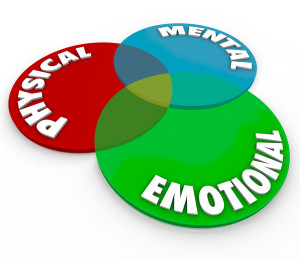It’s all a balancing act
If you’ve ever tried to stand on one foot, you know that achieving balance is a process. As you shift your weight to your standing leg, you begin to negotiate with gravity and your body to help keep you upright.
As you stand there, you begin to notice subtle to not-so-subtle shifts that require you to make adjustments so that you can balance. You never just arrive at a point of balance and get to stay there indefinitely. There is a continual back and forth that is necessary to keep us upright.
So it is with treating depression & anxiety. Each of these conditions require a continual negotiation with our bodies, minds, emotions and the outside world to facilitate our managing the effects of either. It is easy for someone with depression & anxiety to move into hopelessness. The ruminations, despair and fear can seem insurmountable. It appears that the people around us are handling their lives so much better than we are (often an illusion) and we worry that no one can or wants to understand what is happening inside us.
Moving away from the disease model of depression & anxiety
I don’t think that it is helpful to view depression & anxiety as diseases to be treated. In the traditional, western approach to medicine, disease is treated with medication. This belief does wonders for the bottom lines of the medical, health insurance and pharmaceutical industries but, often, offers little relief (and, certainly not a cure) to those who suffer with depression & anxiety.
I prefer to look at depression & anxiety as indicators of a life out of balance. Rather than throwing a pill at the problem, it is far more beneficial to begin treating all aspects of the body/mind system. The most accessible place to start is the physical body, start moving. We don’t need to run marathons or, even, 5Ks. Go outside, weather and safety permitting, or go to a gym, mall or rec center and start moving your body in a steady, rhythmic fashion. My favorite piece of advice to give to my patients, “Go out and walk like you mean it.” Research shows us that regular, physical activity is the single most effective behavior for positively regulating mood. It is necessary for everyone and critical for anyone with mood disregulation. Exercise is the place to start. If physical limitation prohibits vigorous exercise, do what you can and keep reading for more behaviors to help you bring greater balance to your life.
Trim Tab Theory of Transformation & Growth
Architect, visionary, philosopher and inventor Buckminster Fuller (July 12, 1895 – July 1, 1983) introduced his Trim Tab Theory of Transformation & Growth. He uses the analogy of a large ship with a large rudder. The rudder is made of thousands of pounds of steel and is surrounded by thousands of pounds of water pressure. The amount of force that it would take to move the rudder is greater than could be supplied by a motor that could fit on the ship. At the end of the rudder is a smaller, lighter, more mobile piece of steel called a trim tab. When the trim tab is more easily moved, it coaxes the rudder to move in the desired direction.
How does this apply to this topic? Imagine that depression & anxiety are the rudder. If I asked you to move the rudder (stop being anxious or depressed), you wouldn’t know what to do. But, if I suggested you start focusing on the trim tab components of your life (see my S.T.R.E.S.S.S.S.S Formula For Wellness) and you began to exercise, manage sleep, meditate, etc., you’d, eventually, feel the rudder that is your life begin to move in a better direction.
I know, from personal experience, how depression & anxiety can rob us of motivation. The mere idea of taking on a self-care regimen can feel too big to even consider. My advice, pick something, pick one self-care behavior (my bias is toward exercise being the first) and start to make small, incremental movement toward making it a part of your life. Start to move the trim tab and, as you begin to feel the benefit, you may find the motivation and increased sense of control to bring other self-balancing behaviors into your life.
You don’t have to do this alone. Seek the help of friends and family, where possible. Enlist the help of a mental health professional. Tell them about the Trim Tab Theory and choose the element of self-care that you want to start with. Tell people, specifically, how they can support you: “Call me every morning at 6:00 and remind me to get up.” “Keep inviting me to go for walks, even if I decline.” This will help you to feel less alone and may empower your efforts.
Here is an interview with Dr. James Gordon about his book Unstuck: Your Guide to the Seven-Stage Journey Out of Depression. He has some good ideas. Also, contact me about using Energy Psychology techniques that can help to reveal self-defeating patterns of thinking and discharge the emotion that keeps us stuck in depression & anxiety. I can work with you face-to-face or remotely.
Do what you can, no matter how small your efforts seem. The most important qualities to managing depression & anxiety or making any kind of change in our lives are Practice, Patience & Persistence.
Having successfully engaged the process of learning to manage a life-time of depression, I can tell you that it can be done. Your depressed mind will tell you that it is all a waste of effort and that your situation is unique and can’t be helped. When this happens, say, “Thank you. This is real and it is not true.” You’re saying “thank you” to the mind that is trying, in unhelpful ways, to keep you stuck and feeling safe, “this is real,” acknowledging to the mind/body that the feelings you have are real and “this is not true” to challenge the lies that the depressed/anxious mind produces.
For people currently taking medication for depression & anxiety, don’t stop without the guidance of your healthcare professional. Fortifying yourself with a sound practice of self-care can bring greater benefits from your medication and can offer the foundation upon which to gradually discontinue the use of medication, if that is the course of action you and your prescriber undertake together.
Contact me for more help. I wish you the best.

